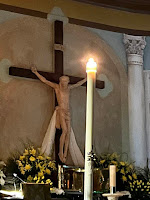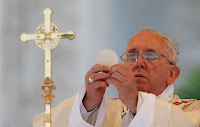5th Sunday of Easter: Connected to God, we find our values, we find ourselves, we find life.
No Man Is an Island by John Donne
No man is an island,
Entire of itself;
Every man is a piece of the continent,
A part of the main.
If a clod be washed away by the sea,
Europe is the less,
As well as if a promontory were:
As well as if a manor of thy friend's
Or of thine own were.
Any man's death diminishes me,
Because I am involved in mankind.
And therefore never send to know for whom the bell tolls;
It tolls for thee.
No man, or person, is an island, a poem by John Donne from the early 1600’s. A poem of the connectedness of humanity. A theme also picked up on a book by Thomas Merton of the same name.
No man is an island,
Entire of itself;
Every man is a piece of the continent,
A part of the main.
If a clod be washed away by the sea,
Europe is the less,
As well as if a promontory were:
As well as if a manor of thy friend's
Or of thine own were.
Any man's death diminishes me,
Because I am involved in mankind.
And therefore never send to know for whom the bell tolls;
It tolls for thee.
No man, or person, is an island, a poem by John Donne from the early 1600’s. A poem of the connectedness of humanity. A theme also picked up on a book by Thomas Merton of the same name.
Who are we and how do we live and operate? Have we ever stopped, considered our actions, our choices, our ethics, our morals and how we came to have them? It could be something as small as when we eat dinner, to core beliefs that drive us.
I think one of the values of aging is a certain wisdom and a certain objectivity about ourselves and life. We can see things with a little more clarity, but not always.
Then there are those adolescents, which I would never ever want to be again. That time in our lives we begin to consciously take on values and begin to assert what we think is our uniqueness, our individuality. Yet, what often happens teens simply follow the crowd, their peers. They may think they are independent, but sorry, you simply follow the crowd too.
Nature versus nurture is an old question, but it is also a nonsensical question. It is both, not one or the other. We become who we are through the values we gain from those around us, nurture; and through our capacity to think and choose, our nature.
During an Engaged Encounter weekend the couples are induced to consider the values they have been brought up with as individuals, and what values they merge with as they marry and create their own family. Again can be simple matters; dinner is eaten at 5:30pm, Christmas gifts are opened in the evening. Can be serious matters, going to Church as a family.
We gain our values from our families, from our friends, and we acquire new ones as we mature, and we let some go as well. Yet, there are also core values that we hold onto, hopefully, that truly make us who we are.
Recently, I was listening to a report on teens who struggle with depression or with their emotions. A lot of teens, especially after COVID, struggle to make sense of emotions, and also lack the means to make sense. The speaker also noted that the loss of religion does play into it because there is a loss of community which exacerbates the sense of isolation. They also lose out on the wisdom of the community, and the values of a community. This includes their parents as well.
I have asked and heard why people like the Catholic Church. One common response I hear is that wherever they go, the mass is the same; or they like the aesthetics. Fine answers, but isn’t there something more deep? More profound?
Jesus speaks of a deep connection to God. In Christ, and through Christ, we become connected to a deeper source of life, a deeper sense of values that help us to experience life.
These values of love, the value of the dignity of life, the value of giving of oneself for others, the value of humility, compassion, kindness, mercy. These are eternal values. To live life eternally means to have these values within us. Through Jesus Christ we know that these values bring life, because he lived them and despite others who valued power over others, who valued money, who devalued other persons, thus they killed Jesus; he rose from that.
Jesus lived these values; he healed, he welcomed, he forgave, he accepted and loved. He demonstrated to his disciples this is who God the Father is!
We as Church, we are called to make those same values our own, and to live them out. It also means we are assessing ourselves, and asking ourselves as a parish, diocese and church, what values are we holding onto, and do they reflect the Gospel, or something less.
We can see the Church over the centuries making these turns, these changes in light of the signs of the times; we see this with slavery, once accepted not abhorred. We see this in our modern times with the death penalty, once accepted, now also condemned, starting with St. Pope John Paul II, through Benedict until Francis.
And now, the value of community and listening to each other is coming into the fore, once again; what we call Synodality. A value once at the core of the early church, lost in the following centuries, and now being revived.
Even as a diocese and parish, we look at ourselves…how do we reflect the face of Jesus to our community, to our youth, to each other? How are we living out the Values of Jesus, the eternal values of God? We have striven to become a more welcoming and hospitable parish, for belonging leads to believing. It means maybe the church is not as quiet as we maybe want, so we give that up, so that families feel welcomed and want to bring their children to encounter God here.
Young persons are in the midst of celebrating their first communions, their conscious choice to personally acquire the values of Jesus.
They, as we do each communion, eat and drink of love, of compassion, of humility and self service; we all eat and drink God’s forgiveness; we make these values part of our body and soul.
Not just for our sake, but for the sake of the world; for our capacity to live them out.
It does mean we must stay connected to Christ, who is our way, our truth and our life. We stay connected to Christ wherever and whenever Christ is truly present: in the community that Gathers together to worship, in the Word proclaimed, in the person of the priest, and most especially in the Sacrament of communion. It means we take responsibility for this connection, for ourselves and for our children.
When we distance ourselves from Christ, we distance ourselves from values that bring us to fullness of life; our values become superficial, smaller, more about our needs, wants and desires. We become more susceptible to falling into our egos, our anger, our sadness and fears.
This is not life. And too many of us have fallen into this.
Catholicism means to follow and be united to Christ in a deeper way. Catholicism means to incorporate, to make God’s eternal values part of our own. Catholicism means to find ourselves, to know ourselves through those deep connections, with God, with a community. We are no island.






Comments
Post a Comment